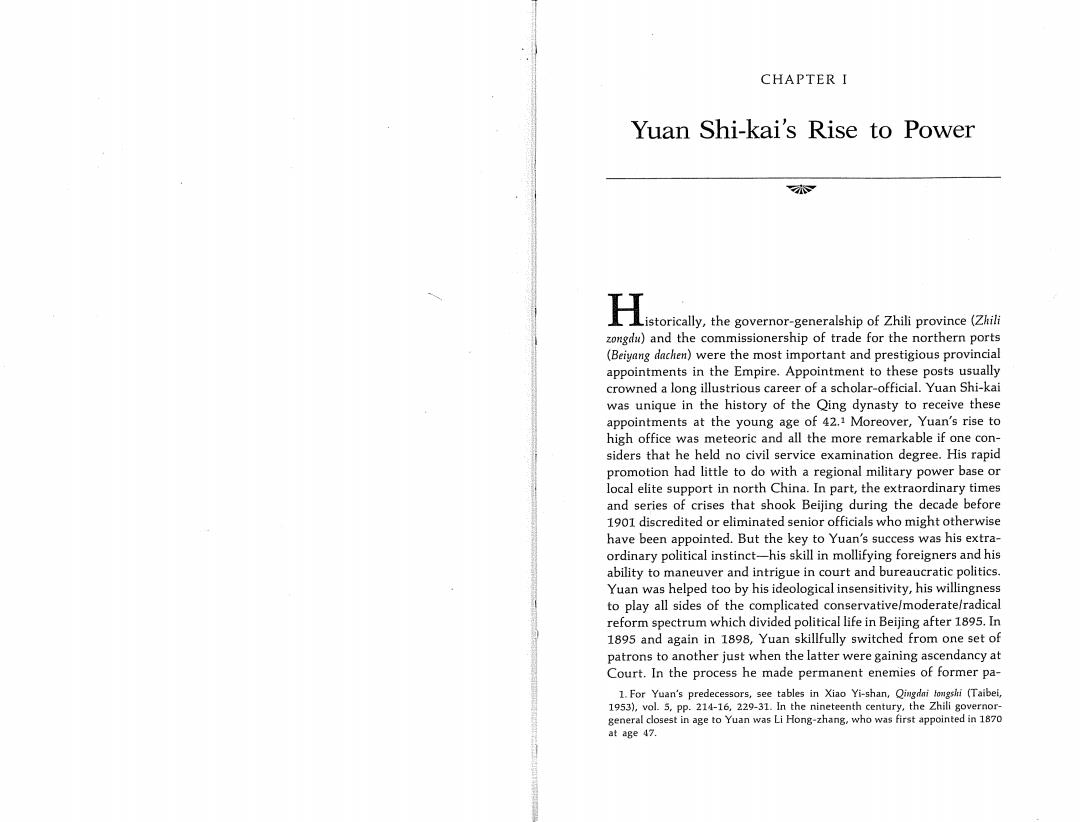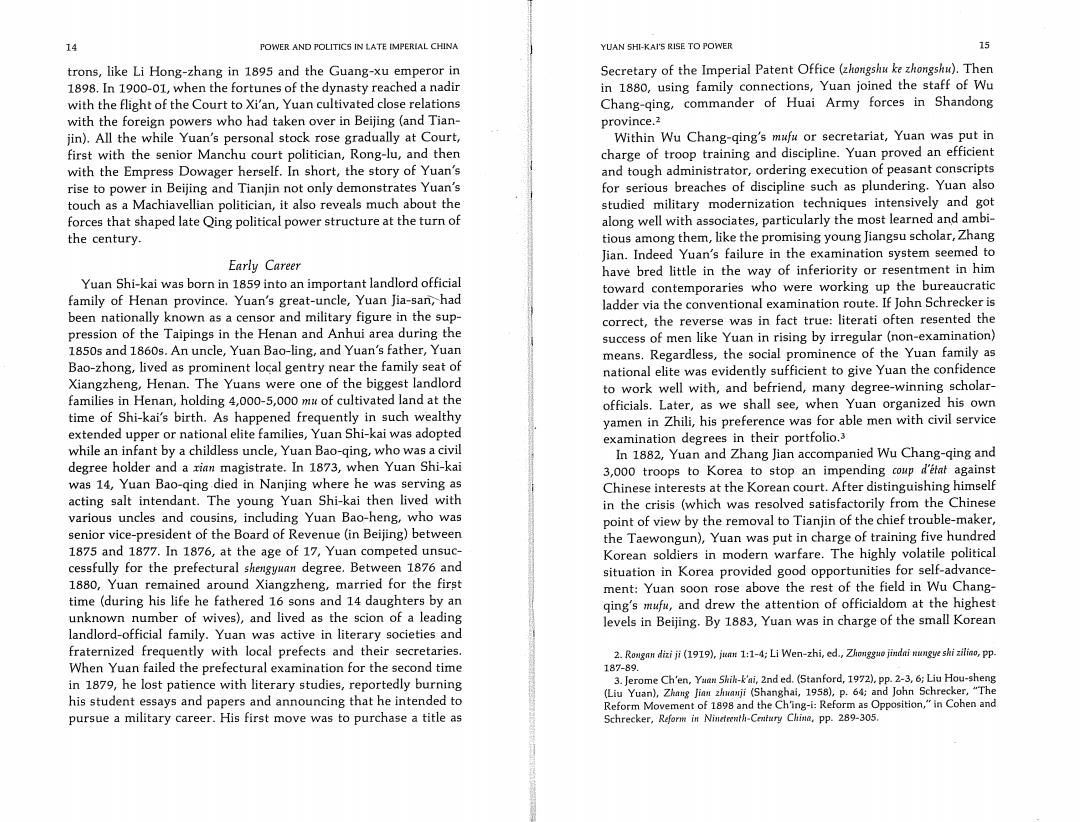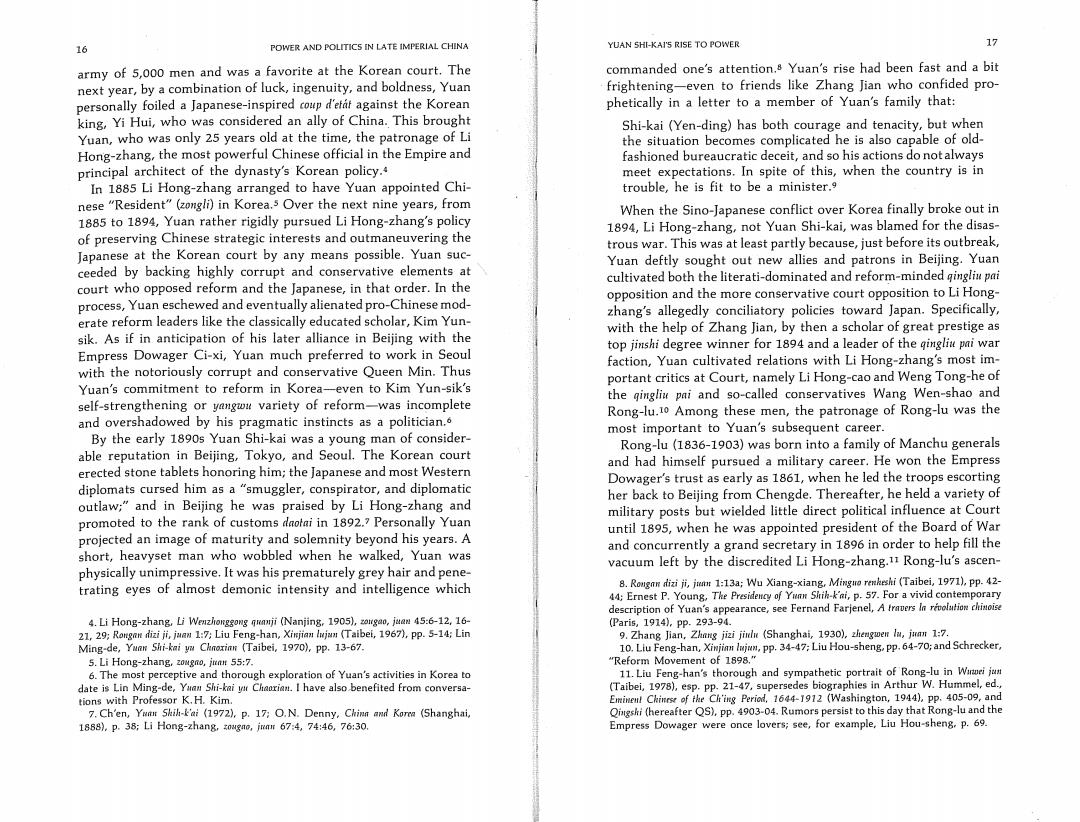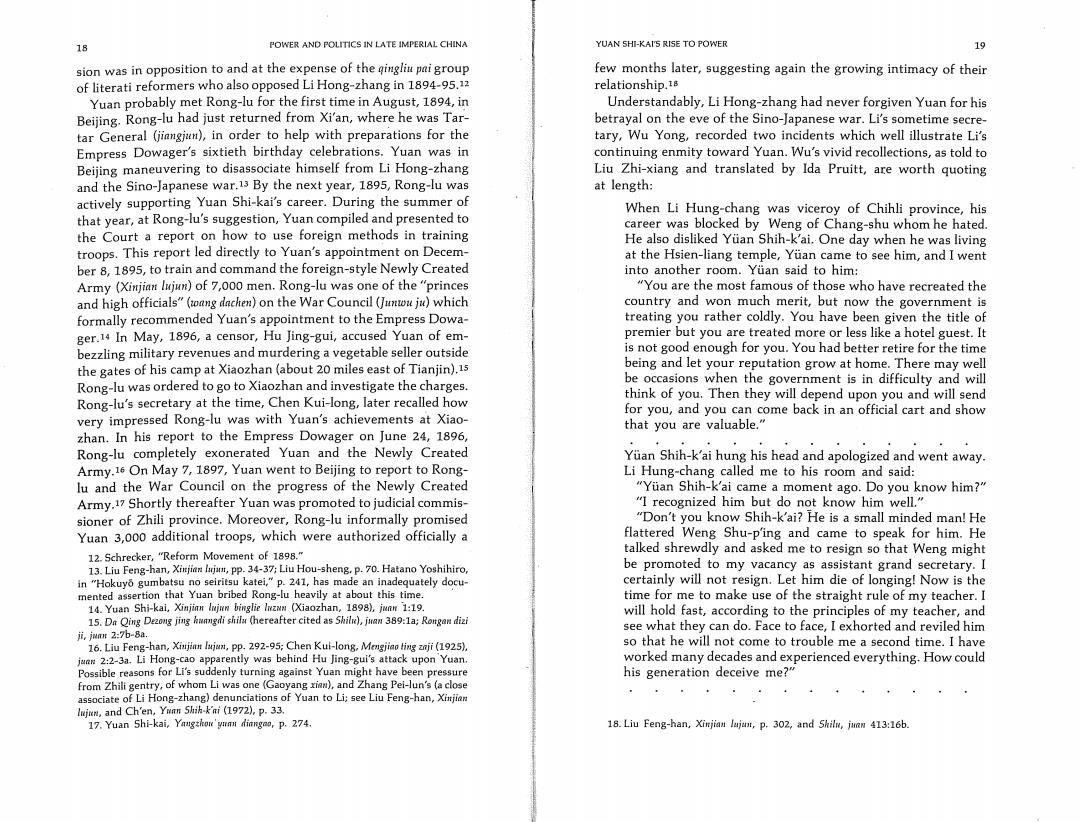
10 POWER AND POLITICS IN LATE IMPERIAL CHINA INTRODUCTION 11 of government.The new movement was motivated in part by self- power as a late Qing official,paying special attention to his career interest and in part by nationalism,with contradictory conse- as governor-general of Zhili province and a high official in Beijing quences for formal government,depending on how it was per- from 1901 to 1909.Unlike the great self-strengthening statesmen ceived as serving national and elite interests.2s of an earlier generation such as Li Hong-zhang and Zhang Zhi- The latter argument has convinced me that the differing scholar- dong,Yuan Shi-kai was not much interested in,nor sensitive to, ly notions about basic power structure in late Imperial China from issues of formal political ideology-a weakness which proved fatal Luo Er-gang to Philip Kuhn to Kwang-ching Liu are not incompati- by the end of his career.Although probably the most effective ble.In part it is a question of emphasis which can be explained by reform administrator of his generation,Yuan's explanations were the different source materials used and regions studied (North- consistently brief and trite.As a man of action and few words, South differences being particularly important and in need of much Yuan Shi-kai was first and foremost concerned with the levers of more exploration).A useful model or paradigm of political power power. structure in the later Imperial period is one of three simultaneously expanding and overlapping nodes of power:the central govern- ment in Beijing;provincial governments and armies at the regional level;and local elites at the sub-xian level.Included in the paradigm is the idea that there was less competition and more cooperation between power centers than is usually acknowledged.There was a good reason for this:the need to stick together in face of ac- celerating pressure from a common enemy-Western and Japanese imperialism.Moreover,if this triple-leveled expansion of power was at the expense of anyone,it was the peasantry,who,despite their restlessness,seemed as firmly bound by a combination of government and elite controls as at any time during middle or early Qing dynasty.26 Finally,the focus in this study is on the two chief determinants of the political power structure in the late Imperial period:(1)the domestic influence of imperialism,and(2)the relationship between expanding nodes of power at the central/provincial government and local elite levels.It is not on the main and well-studied ideologi- cal issue dividing bureaucracy and local elites at the time:reform or modernization along Western lines and how far and fast it should proceed.27 My vehicle is an analysis of Yuan Shi-kai's political 25.Ernest P.Young,The Presidency of Yaom,chap.1. 26.On this last point,see Jing Su and Luo Lun,Qingdai Shandong jingying dizha de shekni xingzhi (Jinan,1959)and Yuji Muramatsu,"A Documentary Study of Chinese Landlordism in Late Ch'ing and Early Republican Kiangnan,"Bulletin of the School of Orienlal and African Siudies 29.3 (1966):566-99. 27.For a summary of the state of the field in reform studies and an indication of the degree of interest in the subject,see Paul Cohen and John Schrecker,eds.,Reforo in Niseternth-Century Chinn(Cambridge,Mass.,1976).A fine study of the reform issue in the early twentieth century is Bays,Chins Euters thr Tioentirth Crutury

CHAPTER I Yuan Shi-kai's Rise to Power 冰 srically,the governor-generalship of Zhili province zongdu)and the commissionership of trade for the northern ports (Beiyang dachen)were the most important and prestigious provincial appointments in the Empire.Appointment to these posts usually crowned a long illustrious career of a scholar-official.Yuan Shi-kai was unique in the history of the Qing dynasty to receive these appointments at the young age of 42.1 Moreover,Yuan's rise to high office was meteoric and all the more remarkable if one con- siders that he held no civil service examination degree.His rapid promotion had little to do with a regional military power base or local elite support in north China.In part,the extraordinary times and series of crises that shook Beijing during the decade before 1901 discredited or eliminated senior officials who might otherwise have been appointed.But the key to Yuan's success was his extra- ordinary political instinct-his skill in mollifying foreigners and his ability to maneuver and intrigue in court and bureaucratic politics. Yuan was helped too by his ideological insensitivity,his willingness to play all sides of the complicated conservative/moderate/radical reform spectrum which divided political life in Beijing after 1895.In 1895 and again in 1898,Yuan skillfully switched from one set of patrons to another just when the latter were gaining ascendancy at Court.In the process he made permanent enemies of former pa- 1.For Yuan's predecessors,see tables in Xiao Yi-shan,Qingdni lomgsiri (Taibel, 1953),vol.5,pp.214-16,229-31.In the nineteenth century,the Zhili governor- general closest in age to Yuan was Li Hong-zhang,who was first appointed in 1870 at age 47

14 POWER AND POLITICS IN LATE IMPERIAL CHINA YUAN SHI-KAI'S RISE TO POWER 小 trons,like Li Hong-zhang in 1895 and the Guang-xu emperor in Secretary of the Imperial Patent Office(zhongshu ke zhongshu).Then 1898.In 1900-01,when the fortunes of the dynasty reached a nadir in 1880,using family connections,Yuan joined the staff of Wu with the flight of the Court to Xi'an,Yuan cultivated close relations Chang-qing,commander of Huai Army forces in Shandong with the foreign powers who had taken over in Beijing(and Tian- province.2 jin).All the while Yuan's personal stock rose gradually at Court, Within Wu Chang-qing's mufu or secretariat,Yuan was put in first with the senior Manchu court politician,Rong-lu,and then charge of troop training and discipline.Yuan proved an efficient with the Empress Dowager herself.In short,the story of Yuan's and tough administrator,ordering execution of peasant conscripts rise to power in Beijing and Tianjin not only demonstrates Yuan's for serious breaches of discipline such as plundering.Yuan also touch as a Machiavellian politician,it also reveals much about the studied military modernization techniques intensively and got forces that shaped late Qing political power structure at the turn of along well with associates,particularly the most learned and ambi- the century. tious among them,like the promising young Jiangsu scholar,Zhang Jian.Indeed Yuan's failure in the examination system seemed to Early Career have bred little in the way of inferiority or resentment in him Yuan Shi-kai was born in 1859 into an important landlord official toward contemporaries who were working up the bureaucratic family of Henan province.Yuan's great-uncle,Yuan Jia-san,had ladder via the conventional examination route.If John Schrecker is been nationally known as a censor and military figure in the sup- correct,the reverse was in fact true:literati often resented the pression of the Taipings in the Henan and Anhui area during the success of men like Yuan in rising by irregular(non-examination) 1850s and 1860s.An uncle,Yuan Bao-ling,and Yuan's father,Yuan means.Regardless,the social prominence of the Yuan family as Bao-zhong,lived as prominent local gentry near the family seat of national elite was evidently sufficient to give Yuan the confidence Xiangzheng,Henan.The Yuans were one of the biggest landlord to work well with,and befriend,many degree-winning scholar- families in Henan,holding 4,000-5,000 m of cultivated land at the officials.Later,as we shall see,when Yuan organized his own time of Shi-kai's birth.As happened frequently in such wealthy yamen in Zhili,his preference was for able men with civil service extended upper or national elite families,Yuan Shi-kai was adopted examination degrees in their portfolio.3 while an infant by a childless uncle,Yuan Bao-qing,who was a civil In 1882,Yuan and Zhang Jian accompanied Wu Chang-qing and degree holder and a rian magistrate.In 1873,when Yuan Shi-kai 3,000 troops to Korea to stop an impending coup d'etat against was 14,Yuan Bao-qing died in Nanjing where he was serving as Chinese interests at the Korean court.After distinguishing himself acting salt intendant.The young Yuan Shi-kai then lived with in the crisis(which was resolved satisfactorily from the Chinese various uncles and cousins,including Yuan Bao-heng,who was point of view by the removal to Tianjin of the chief trouble-maker, senior vice-president of the Board of Revenue(in Beijing)between the Taewongun),Yuan was put in charge of training five hundred 1875 and 1877.In 1876,at the age of 17,Yuan competed unsuc- Korean soldiers in modern warfare.The highly volatile political cessfully for the prefectural shengyuan degree.Between 1876 and situation in Korea provided good opportunities for self-advance- 1880,Yuan remained around Xiangzheng,married for the first ment:Yuan soon rose above the rest of the field in Wu Chang- time (during his life he fathered 16 sons and 14 daughters by an qing's mufu,and drew the attention of officialdom at the highest unknown number of wives),and lived as the scion of a leading levels in Beijing.By 1883,Yuan was in charge of the small Korean landlord-official family.Yuan was active in literary societies and fraternized frequently with local prefects and their secretaries. 2.Romgnn dizi ji (1919),junn 1:1-4;Li Wen-zhi,ed.,Zhongguo jindni nungye ski zilino,pp. When Yuan failed the prefectural examination for the second time 187-89. in 1879,he lost patience with literary studies,reportedly burning 3.Jerome Ch'en,Yuan Skik-k'ai,2nd ed.(Stanford,1972),pp.2-3,6;Liu Hou-sheng his student essays and papers and announcing that he intended to (Liu Yuan),Zhang Jian zhasji (Shanghai,1958),p.64;and John Schrecker,"The Reform Movement of 1898 and the Ch'ing-i:Reform as Opposition,"in Cohen and pursue a military career.His first move was to purchase a title as Schrecker,Reforn in Ninetrenth-Ceniury Chine,pp.289-305

16 POWER AND POLITICS IN LATE IMPERIAL CHINA YUAN SHI-KAI'5 RISE TO POWER 17 army of 5,000 men and was a favorite at the Korean court.The commanded one's attention.s Yuan's rise had been fast and a bit next year,by a combination of luck,ingenuity,and boldness,Yuan frightening-even to friends like Zhang Jian who confided pro- personally foiled a Japanese-inspired coup d'eldt against the Korean phetically in a letter to a member of Yuan's family that: king,Yi Hui,who was considered an ally of China.This brought Shi-kai (Yen-ding)has both courage and tenacity,but when Yuan,who was only 25 years old at the time,the patronage of Li the situation becomes complicated he is also capable of old- Hong-zhang,the most powerful Chinese official in the Empire and fashioned bureaucratic deceit,and so his actions do not always principal architect of the dynasty's Korean policy. meet expectations.In spite of this,when the country is in In 1885 Li Hong-zhang arranged to have Yuan appointed Chi- trouble,he is fit to be a minister.? nese"Resident"(zongli)in Korea.s Over the next nine years,from When the Sino-Japanese conflict over Korea finally broke out in 1885 to 1894,Yuan rather rigidly pursued Li Hong-zhang's policy 1894,Li Hong-zhang,not Yuan Shi-kai,was blamed for the disas- of preserving Chinese strategic interests and outmaneuvering the Japanese at the Korean court by any means possible.Yuan suc- trous war.This was at least partly because,just before its outbreak, Yuan deftly sought out new allies and patrons in Beijing.Yuan ceeded by backing highly corrupt and conservative elements at cultivated both the literati-dominated and reform-minded qinglin pai court who opposed reform and the Japanese,in that order.In the process,Yuan eschewed and eventually alienated pro-Chinese mod- opposition and the more conservative court opposition to Li Hong- zhang's allegedly conciliatory policies toward Japan.Specifically, erate reform leaders like the classically educated scholar,Kim Yun- with the help of Zhang Jian,by then a scholar of great prestige as sik.As if in anticipation of his later alliance in Beijing with the top jinshi degree winner for 1894 and a leader of the qinglin pai war Empress Dowager Ci-xi,Yuan much preferred to work in Seoul faction,Yuan cultivated relations with Li Hong-zhang's most im- with the notoriously corrupt and conservative Queen Min.Thus portant critics at Court,namely Li Hong-cao and Weng Tong-he of Yuan's commitment to reform in Korea-even to Kim Yun-sik's the qinglin pai and so-called conservatives Wang Wen-shao and self-strengthening or yangwu variety of reform-was incomplete Rong-lu.10 Among these men,the patronage of Rong-lu was the and overshadowed by his pragmatic instincts as a politician. most important to Yuan's subsequent career. By the early 1890s Yuan Shi-kai was a young man of consider- able reputation in Beijing,Tokyo,and Seoul.The Korean court Rong-lu(1836-1903)was born into a family of Manchu generals and had himself pursued a military career.He won the Empress erected stone tablets honoring him;the Japanese and most Western Dowager's trust as early as 1861,when he led the troops escorting diplomats cursed him as a"smuggler,conspirator,and diplomatic her back to Beijing from Chengde.Thereafter,he held a variety of outlaw;"and in Beijing he was praised by Li Hong-zhang and military posts but wielded little direct political influence at Court promoted to the rank of customs daotai in 1892.7 Personally Yuan until 1895,when he was appointed president of the Board of War projected an image of maturity and solemnity beyond his years.A and concurrently a grand secretary in 1896 in order to help fill the short,heavyset man who wobbled when he walked,Yuan was vacuum left by the discredited Li Hong-zhang.11 Rong-lu's ascen- physically unimpressive.It was his prematurely grey hair and pene- trating eyes of almost demonic intensity and intelligence which 8.Rongan dizi ji,jm 1:13a;Wu Xiang-xiang,Minguo renkeshi (Taibei,1971),pp.42- 44:Ernest P.Young,The Presidency of Yumn Shrih-k'ai,p.57.For a vivid contemporary description of Yuan's appearance,see Fernand Farjenel,A traversIn rltio ciis 4.Li Hong-zhang,Li Wenzhionggong qmanji (Nanjing,1905),2ugao,juan 45:6-12,16- (Paris,1914》,pp.293-94. 21,29:Rongan dizi ji,jn 1:7;Liu Feng-han,Xinjian Iwjsn (Taibei,1967),pp.5-14;Lin 9.Zhang Jian,Zhang jizi jinln (Shanghai,1930),zhengwen lu,juan 1:7. Ming-de,Yuan Shi-kai yu Chnoxinn (Taibei,1970),pp.13-67. 10.Liu Feng-han,Xinjimi luj,pp.34-47;Liu Hou-sheng,pp.64-70;and Schrecker, 5.Li Hong-zhang,zomgno,jman 55:7. Reform Movement of 1898." 6.The most perceptive and thorough exploration of Yuan's activities in Korea to 11.Liu Feng-han's thorough and sympathetic portrait of Rong-lu in Wieij date is Lin Ming-de,Yan Shi-kaiy Chaorian.I have also benefited from conversa- (Taibei,1978),esp.pp.21-47,supersedes biographies in Arthur W.Hummel,ed.. tions with Professor K.H.Kim. Eminen!Chinese of the Ch'ing Period,1644-1912 (Washington,1944),pp.405-09,and 7.Ch'en,Yumr Skih-k'ai (1972),p.17:O.N.Denny,Chinn and Korea (Shanghai, Qingski (hereafter QS),pp.4903-04.Rumors persist to this day that Rong-lu and the 1888),p.38:Li Hong-zhan80g,jmmn67:4,74:46,76:30, Empress Dowager were once lovers;see,for example,Liu Hou-sheng,p.69

18 POWER AND POLITICS IN LATE IMPERIAL CHINA YUAN SHI-KAIS RISE TO POWER 19 sion was in opposition to and at the expense of the qingliu pai group few months later,suggesting again the growing intimacy of their of literati reformers who also opposed Li Hong-zhang in 1894-95.12 relationship.18 Yuan probably met Rong-lu for the first time in August,1894,in Understandably,Li Hong-zhang had never forgiven Yuan for his Beijing.Rong-lu had just returned from Xi'an,where he was Tar- betrayal on the eve of the Sino-Japanese war.Li's sometime secre- tar General (jiangjsn),in order to help with preparations for the tary,Wu Yong,recorded two incidents which well illustrate Li's Empress Dowager's sixtieth birthday celebrations.Yuan was in continuing enmity toward Yuan.Wu's vivid recollections,as told to Beijing maneuvering to disassociate himself from Li Hong-zhang Liu Zhi-xiang and translated by Ida Pruitt,are worth quoting and the Sino-Japanese war.13 By the next year,1895,Rong-lu was at length: actively supporting Yuan Shi-kai's career.During the summer of that year,at Rong-lu's suggestion,Yuan compiled and presented to When Li Hung-chang was viceroy of Chihli province,his career was blocked by Weng of Chang-shu whom he hated. the Court a report on how to use foreign methods in training He also disliked Yuan Shih-k'ai.One day when he was living troops.This report led directly to Yuan's appointment on Decem- at the Hsien-liang temple,Yuan came to see him,and I went ber 8,1895,to train and command the foreign-style Newly Created into another room.Yuan said to him: Army (Xinjian lujun)of 7,000 men.Rong-lu was one of the "princes "You are the most famous of those who have recreated the and high officials"(woang dachen)on the War Council (Jumtou ju)which country and won much merit,but now the government is formally recommended Yuan's appointment to the Empress Dowa- treating you rather coldly.You have been given the title of ger.14 In May,1896,a censor,Hu Jing-gui,accused Yuan of em- premier but you are treated more or less like a hotel guest.It bezzling military revenues and murdering a vegetable seller outside is not good enough for you.You had better retire for the time the gates of his camp at Xiaozhan(about 20 miles east of Tianjin).1s being and let your reputation grow at home.There may well Rong-lu was ordered to go to Xiaozhan and investigate the charges. be occasions when the government is in difficulty and will Rong-lu's secretary at the time,Chen Kui-long,later recalled how think of you.Then they will depend upon you and will send very impressed Rong-lu was with Yuan's achievements at Xiao- for you,and you can come back in an official cart and show that you are valuable." zhan.In his report to the Empress Dowager on June 24,1896, Rong-lu completely exonerated Yuan and the Newly Created Yuan Shih-k'ai hung his head and apologized and went away. Army.16 On May 7,1897,Yuan went to Beijing to report to Rong- Li Hung-chang called me to his room and said: lu and the War Council on the progress of the Newly Created "Yuan Shih-k'ai came a moment ago.Do you know him?" Army.17 Shortly thereafter Yuan was promoted to judicial commis- "I recognized him but do not know him well." sioner of Zhili province.Moreover,Rong-lu informally promised "Don't you know Shih-k'ai?He is a small minded man!He Yuan 3,000 additional troops,which were authorized officially a flattered Weng Shu-p'ing and came to speak for him.He 12.Schrecker,"Reform Movement of 1898." talked shrewdly and asked me to resign so that Weng might 13.Liu Feng-han,Xinjinn laj,pp.34-37;Liu Hou-sheng.p.70.Hatano Yoshihiro, be promoted to my vacancy as assistant grand secretary.I in "Hokuyo gumbatsu no seiritsu katei,"p.241,has made an inadequately docu- certainly will not resign.Let him die of longing!Now is the mented assertion that Yuan bribed Rong-lu heavily at about this time. time for me to make use of the straight rule of my teacher.I 14.Yuan Shi-kai,Xinjinn lujnn binglie InzNn (Xiaozhan,1898),junn 1:19. will hold fast,according to the principles of my teacher,and 15.Da Qing Dezong jing hdi shil(hereafter cited as Shil),jan 389:1a;Rongan dizi see what they can do.Face to face,I exhorted and reviled him ji,jumt 2:7b-8a. 16.Liu Feng-han,Xinjinn lujun,pp.292-95;Chen Kui-long,Mengjiao ling znji(1925). so that he will not come to trouble me a second time.I have j2:2-3a.Li Hong-cao apparently was behind Hu Jing-gui's attack upon Yuan. worked many decades and experienced everything.How could Possible reasons for Li's suddenly turning against Yuan might have been pressure his generation deceive me?" from Zhili gentry,of whom Li was one (Gaoyang xinm),and Zhang Pei-lun's (a close associate of Li Hong-zhang)denunciations of Yuan to Li;see Liu Feng-han,Xinjian lujun,and Ch'en,Ywan 5hih-kni (1972),p.33. 17.Yuan Shi-kai,Yaugzhou'yum dinngeo,p.274. 18.Liu Feng-han,Xinjian luju,p.302,and Shilm,jn 413:16b